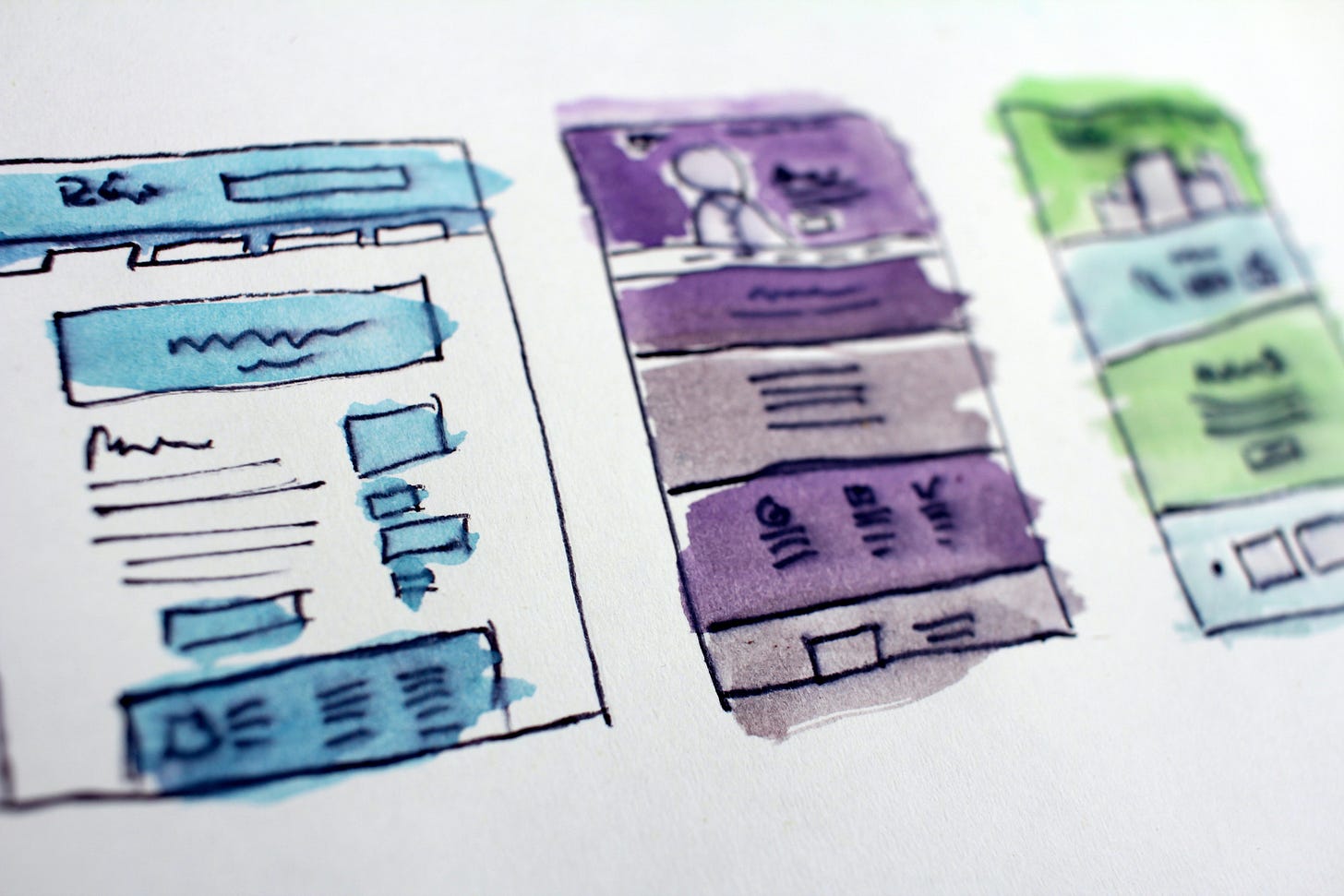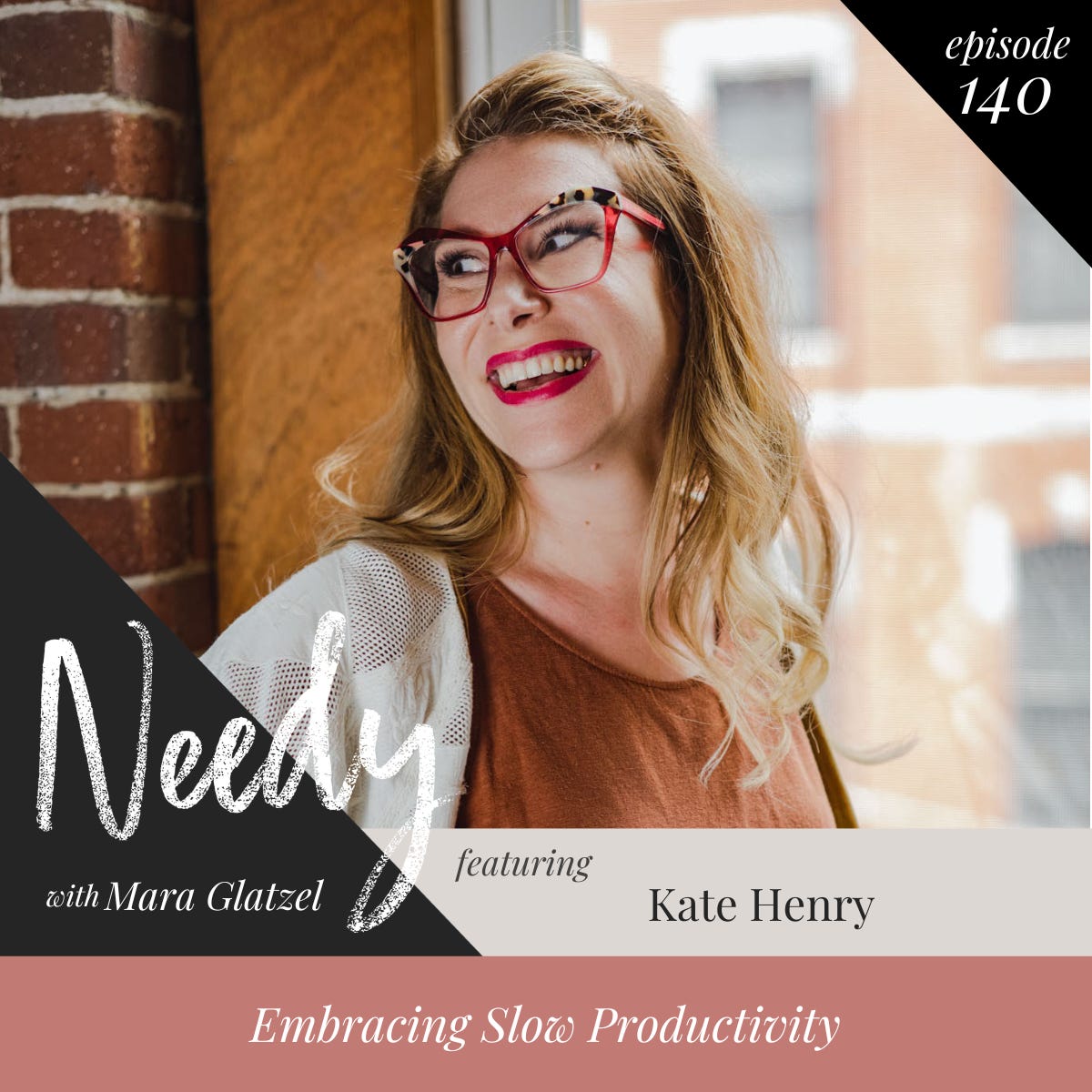Is Your Approach a Blueprint, a Recipe, or a Strategy?
looking at projects from new angles [+ podcast news]
You can listen to an audio version of this newsletter above. Please note that this is unedited, there are some natural stumbles, and I’m recording in my home office. Thank you!
New Podcast Interview on Mara Glatzel’s Needy
I had a lovely time chatting with Mara about all things slow productivity, living with chronic illness, and as Mara put it in the episode description, answering the big question, “How can we untangle ourselves from productivity culture without leaving our big dreams, goals, and interests behind?” I hope you’ll find listening to it as inspiring and nourishing as I felt recording it.
I’m committed to making most of my content free and I also offer co-working and Q&As (submit a question here!) as perks for paid subscribers. Co-working will take place Friday October 27th, Monday November 6th, and Friday December 8th (details and Zoom links here). I’m eternally grateful to all of my free and paid readers, but if upgrading feels like a good choice right now, you can do that here.

Our personal and professional projects vary in terms of depth, breadth, and structure.
For example…
Writing a 500-word newsletter may take a day, while writing a dissertation or a book proposal may take years.
Decluttering your entire apartment isn’t the same as tidying up your kitchen every night before bed.
Getting to “inbox zero” isn’t the same as creating a whole new digital organization system.
While these projects vary in scale and scope, they’re all valiant goals you might want to undertake in an effort to find more ease, comfort, or success.
Productivity approaches could help us to reverse engineer a plan for each of them. We might determine a final ideal outcome, work backward to generate an actionable task list, set deadlines for each task, and generate boundaries around potential distractions. Ideally, we’d do this while also accounting for other tasks that take up our time, energy, and focus.
Let’s be real, though: that list of approaches is hard to figure out on our own—it’s why people hire me as a coach! Not to mention, every project is going to vary in the amount of embedded structure, external evaluation, and personal satisfaction.
Today’s letter isn’t the magic solution to checking each and every project off your to-do list, but it does offer a fresh way to make progress on our projects if we’re feeling stuck.
When we think of our project as a blueprint, recipe, or strategy, we get to look at it from a different angle.
When we try on that new framework, we might envision a new way forward. Here’s how I’d describe each of these methods for working on a project. I’m also including an equation for each, in case you think in logic puzzles like I do.
Blueprint
Creating a foundation or scaffold to build something new
Do X in Y way in order to create Z
Recipe
Ingredients and instructions for completing tasks to produce a final product
X + Y = Z
Strategy
Steps to take with intention and pitfalls to avoid en route to an ideal outcome
First X, then Y, to reach Z
Here’s an example of each in action.
Let’s say your goal is “I want to be more creative.” In this case, your objective (Z) is “increase creativity.”
Blueprint (Do X in Y way in order to create Z)
Increase creativity the following way: identify a space (my desk) and time (45 minutes a day, or roughly how long a 1,000-word first draft takes) to write, then follow through. Depending on how it goes, I may choose to adjust where or how long I write.
Recipe (X + Y = Z)
My ingredients are writing time + my desk + using a writing platform like Scrivener or GoogleDocs so I can track my word count + using a Pomodoro timer app so I can concentrate and listen to rain sounds while I write. My instructions are to write without editing and to stop soon after I reach 1,000 words. I already know that this approach works for me, so it’s likely I won’t need to adjust it, but I’ll scale my output as needed if I’m having a chronic illness flare day.
Strategy (First X, then Y, to reach Z)
Decide how to create (I want to write), then write 1,000 words one day a week, with the intention that no one has to see it but me, to result in having created. Depending on how it goes, I may adjust my strategy to write less words or more days.
If you were to use a blueprint, recipe, or strategy approach to revise a current project, which one would you choose? Share in a comment or by replying via email!
Curiosities
This section of my letters is for things that made me say “hmmm” or “wow!” recently.
I loved
’s recent post , “In Defense of Binge Writing.” I binge wrote a lot when I was in graduate school (it was the norm not to start a term paper until the weekend before it was due), but these days I very rarely do because my writing projects are shorter, I start them earlier, and writing up against a deadline causes me stress-induced back pain flare-ups. That being said, I love long writing sessions where I can brainstorm, draft, and edit on my own terms, which feels like “binge writing” but without the stress.I recently discovered the
by and I’m looking forward to reading her posts about battling insomnia. I’m actually what one might call a “good sleeper,” but only if I have my ridiculously long list of required items (a light-blocking eye mask, a special soft blanket, my sound machine, etc.), so I’m hoping to learn how to increase my sleep quality for the times when I don’t have access to those sleep aids. I recommend Dr. Meaklim’s “A technique to calm racing thoughts at bedtime and help you fall asleep” as a good starting point.
As always, I’m sending you my best wishes to be cozy and tender with yourself. If you have any questions or want to send along a note, feel free to respond to this email or leave a comment below.
Take care and talk soon,
Dr. Kate













thanks for the love today!
Love this way of thinking about productivity. To be honest, I feel like I move between these. I need to think about it more - perhaps the recipe one, as I do exactly what you describe on many days (especially with Scrivener for fiction writing...don't you love that little word count goal box??). Exciting about the podcast. I'll listen to it soon :)